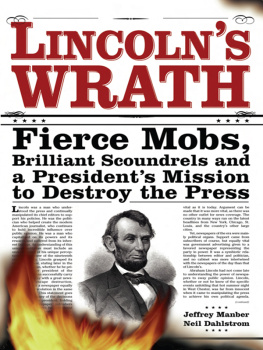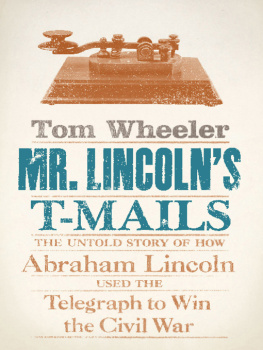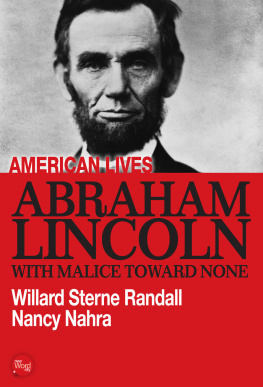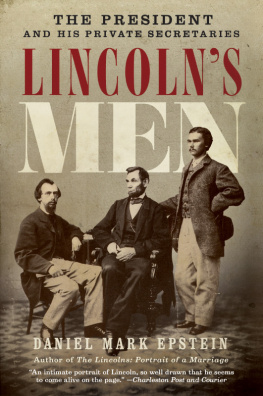
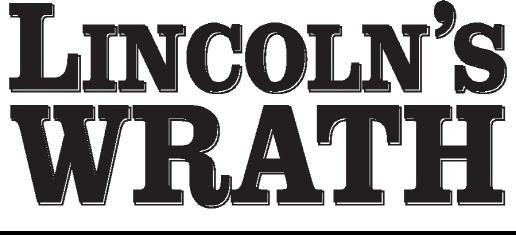
FIERCE MOBS, BRILLIANT
SCOUNDRELS AND A PRESIDENTS
MISSION TO DESTROY THE PRESS
Jeffrey Manber and Neil Dahlstrom

Copyright 2005 by Jeffrey Manber and Neil Dahlstrom
Cover and internal design 2005 by Sourcebooks, Inc.
Cover photos Corbis
Internal photos used by permission as indicated.
Sourcebooks and the colophon are registered trademarks of Sourcebooks, Inc.
All rights reserved. No part of this book may be reproduced in any form or by any electronic or mechanical means including information storage and retrieval systemsexcept in the case of brief quotations embodied in critical articles or reviewswithout permission in writing from its publisher, Sourcebooks, Inc.
Published by Sourcebooks, Inc.
P.O. Box 4410, Naperville, Illinois 605674410
(630) 9613900
FAX: (630) 9612168
www.sourcebooks.com
Library of Congress Cataloging-in-Publication Data
Manber, Jeffrey.
Lincoln's wrath / Jeffrey Manber and Neil Dahlstrom.
p. cm.
Includes bibliographical references and index.
ISBN-13: 978-1-4022-0398-5
ISBN-10: 1-4022-0398-5
1. United States--History--Civil War, 1861-1865--Censorship. 2. Lincoln, Abraham, 1809-1865--Relations with journalists. 3. Hodgson, John, fl. 1843-1863. 4. Jeffersonian (West Chester, Pa. : 1855) 5. Freedom of the press--United States--History--19th century. I. Dahlstrom, Neil, 1976- II. Title.
E609.M36 2005
342.7308'53--dc22
2005027261
Printed and bound in the United States of America.
BVG 10 9 8 7 6 5 4 3 2 1
Such is the all but superstitious devotion of the people to the liberty ofthe press that these pernicious journals have, with the exception of asingle instance in St. Louis, never been interfered with.
Edward Everett, 1861
FREEDOM OF THE PRESSThere has been no interference with theusual publications of the press during 1862, beyond the orders to abstainfrom publishing information of intended military movements.
American Annual Cyclopaedia of the Year 1862
Acknowledgments
This book is the culmination of more than fifteen years of research, and included the assistance of many historians, archivists, librarians and scholars in both the United States and England. During that time, the process of doing research changed dramatically. When we started, much of our time was consumed with photocopying crumbling pages of newspapers. By the end, we were taking advantage of tremendous digitization programs at the Library of Congress, Historical Society of Pennsylvania, and the Making of America project at the University of Michigan for access to original diaries, manuscripts, and newspapers.
Our thanks to Matt Hendon who read early versions of the manuscript and helped sort through countless issues of the Jeffersonian, helping us piece together the Hodgson story.
Always helpful were Diane Rofini and Pam Powell at the Chester County Historical Society, Laurie Rofini at the Chester County Archives and Records Services, Joan Lamphear at the Burlington County Historical Society, Elizabeth Fuller at the Rosenbach Museum and Library, and the archivists at the University of Delaware Special Collections. Historian Douglas Harper, who told part of the Hodgson story in his definitive book West Chester to 1865: That Elegant &Notorious Place, was a champion of the project from our first correspondence and wonderfully thrilled that the full story of the Hodgsons and the Jeffersonian was finally being told.
Lee Arnold, Jack Gumbrecht, and the staff of the Historical Society of Pennsylvania greatly assisted us as we worked to uncover the correspondence, speeches, and editorials of men seemingly long forgotten by historians.
The Albany Public Library, New York Public Library, and British Library in London proved invaluable as we traced the movements of some of the most agile newspapermen of the nineteenth century, and traced public opinion of the Civil War from the United States and abroad.
It should be noted that to a surprising degree, many of the antiwar newspapers of the Civil War are located only in the historical society of the publishing town. It is often overlooked how tenuous are the links to our past. Assuring the preservation of full collections of those news-papers that may not have supported the Lincoln administration is as critical as preserving those more popular.
Without John Willig of Literary Services, Inc., who immediately recognized the timeliness of the story, and his son Josh who championed the project, we would not have had the privilege of seeing this book in print.
We would also like to thank the entire team at Sourcebooks, who have been incredibly open in respecting our thoughts on all aspects of the book. Peter Lynch provided superb editorial direction and guidance, helping us to refine our story in ways that had previously eluded us. Ewurama Ewusi-Mensah located obscure images, and Genene Murphy led us through the always-interesting area of public relations.
Special thanks go to our wives, Dana and Karen. Without your support this book would not have been possible.
CONTENTS
INTRODUCTION
The story in the following pages is a classic Washington whodunit: a story of mystery, of greed, of power gone amuck. That it took place during the Civil War and involves a man named Abraham Lincoln only adds to the intrigue.
The facts are simple to relate.
At the start of the Civil War, pro-Southern newspaper editors and writers like John Hodgson of West Chester, Pennsylvania, publicly criticized the early actions of the Lincoln administration. These editors believed that the Southern states had every right to invoke secession. States rights were paramount to national government, just as Thomas Jefferson had long ago preached, so if South Carolina wanted out of the Union, let it go. There were dozens of antiwar newspapers throughout the Northern states that brazenly took on the new president and his war policy. There was little fear, of course, as freedom of speech is a basic right under our Constitution.
But Lincoln, as the men would soon learn, was playing by a new set of rules. On August 19, 1861, John Hodgsons newspaper office was broken into and all the equipment was destroyed. Assessing the damage, it seemed clear that this outspoken editor would never be able to publish his beloved Jeffersonian again.
Who ordered the newspaper destroyed?
If there were eyewitnesses that evening, no one was talking. After all, Hodgsons Jeffersonian was an eyesore to the town of West Chester. Each week Hodgsons editorials threw barbed criticisms at the Civil War and at Lincoln personally. He wrote colorfully against those who swarmed around the president, calling them sycophants and pimps. His editorials were works of spiteful art, sparing no politician his sarcasms and insights.
As we researched Hodgson for this book, it was difficult for us to have sympathy for him and his Jeffersonian newspaper. The editor displayed all the crass racism too common among many of the pro-Southern supporters, and his writings displayed a fear for any change from the status quo of a nation divided by slavery. Yet we have also grown to admire this man, who picked up the pieces of his destroyed newspaper and prepared to resume publish-ing, risking the mob violence sweeping the Northern states.
Next page
